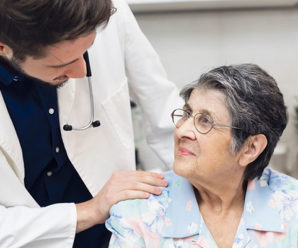The moment you hear you have breast cancer, you should expect the best care possible from your providers. That care is team-based and developed through clinical trials and research to assure best possible outcomes.

“Each patient presents a unique set of issues which are addressed individually with compassion and expert care,” said Dr. Anna Seydel, breast surgeon with Marshfield Clinic Health System. “From screening mammogram to diagnostic imaging with biopsy and immediate referral to breast specialists. As specialists in breast care, we have national metrics in order to be an accredited program.”
Multidisciplinary team
Your team specializing in comprehensive breast care can include nurses, physician assistants, nurse practitioners, nutritionists, psychologists, social workers and occupational and physical therapists.
In the case of breast cancer, your care team should include:
- Primary care physician
- Radiologist
- Pathologist
- Breast surgeon
- Plastic surgeon
- Medical oncologist
- Radiation oncologist
- Genetics counselor
The care team also includes a registered nurse navigator who serves as an important liaison between you and the specialists. Regular communication between team members will follow your progress along the cancer journey.
“Our teams meet for weekly teleconferences to discuss, in an anonymous fashion, all new breast cancer patients as well as monthly meetings to discuss benign breast patients,” Dr. Seydel said. “We also often talk to or meet with each other in between these teleconferences regarding additional patient scenarios as they arise.”
Personalized care
Using the information from exams, your care team will develop a personalized care plan for your specific breast cancer.
“Care decisions are made with breast experts taking into consideration factors that are unique to each patient,” Dr. Seydel said. “Factors unique to each patient that affect the care plan include past medical history, family history, smoking status, level of anxiety and genetic testing results.”
That care doesn’t end when treatment is complete. You should be able to discuss your plan and additional follow-up with a survivorship coordinator after finishing treatment.
“This is especially important for our behavioral therapists who are expert at helping patients coping with a cancer diagnosis, and our team in OB/GYN who are expert in quality of life concerns regarding intimacy and menopause,” Dr. Seydel said.
If you have concerns about breast health, contact your primary care provider. Please see related Shine365 blog articles for additional information about breast cancer.






Leave a Reply